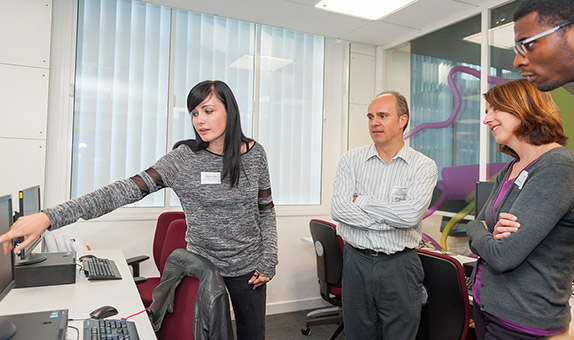Computer Science and Artificial Intelligence BSc (Hons)

Teaching Excellence Framework (TEF) Gold award
Our commitment to high quality teaching has been recognised with a TEF Gold rating. The University has received an overall rating of Gold, as well as securing a Gold award in the framework's two new student experience and student outcomes categories.
Why choose this course?
The course is ideal for students who are interested in developing and applying problem-solving skills to real world problems, would like to develop their understanding of computing, mathematics and statistical techniques through the practical lens of artificial intelligence (AI). With a balance of solid theory and practical application, this course builds on knowledge in relevant areas of statistics, data analysis, probability and programming.
The over-arching aim of the Computer Science and Artificial Intelligence course is to produce highly trained graduates with specialist technical knowledge in the mathematical and computational science aspects of applied AI, capable of solving real world problems with understanding of the wider socio-technical implications.
| Attendance | UCAS code/apply | Year of entry |
|---|---|---|
| 3 years full time | I100 | 2024 (Clearing) 2025 |
| 4 years full time including sandwich year | I101 | 2024 (Clearing) 2025 |
| 4 years full time including foundation year | I102 | 2024 (Clearing) 2025 |
| 6 years part time | Apply direct to the University | 2024 (Clearing) 2025 |
Please note: Teaching on this course may take place on more than one KU campus.
Reasons to choose Kingston University
- To set the material in context as well as inspire our students, we invite leading practitioners from industry, such as Google and IBM, to give guest lectures and workshops.
- There's the opportunity for a year's work placement. This will give you valuable experience and help prepare you for a career in finance or data analysis.
- You'll use applications that model the real world and industry-standard software such as Python R, Matlab and SAS
What you will study
Our programme structure will encourage you to become a more effective, independent and confident self-directed learner. This will appeal to employers and aligns with our Future Skills strategy. Supported by a set of guided learning journeys, you will learn theoretical and practical aspects applied computer science and AI, and gradually develop a portfolio of 'products' and 'artefacts' of different levels of complexity as the outputs of assignments in each module.
Option modules are selected in the spring term, guided by course leader and personal tutors. They are designed to enable you to specialise or tailor the course to meet your individual career goals. These could be roles in the broad area of "data science" (supported, for example, by user experience modules), or more-specialist computer science areas, supported by taking option modules in programming or software development.
Year 1
Year 2
Year 3
This first year provides a broad exposure to the essential domain topics: computing fundamentals, programming, professional practice and mathematics for artificial intelligence.
Core modules
Mathematics for AI
30 credits
Without proper design, evaluation or control, Artificial Intelligence (AI) would dominate the world, hence this module introduces some of the fundamental mathematical concepts that underpin the design and analysis of AI software. You will be introduced to the key mathematical functions and concepts that are the foundation of computer science, of which AI is one of the many strands. You will become familiar with basic concepts and notation, learn topics including logic, set theory, number systems and special functions, as well as linear algebra and introductory probability, on which most AI systems are based.
The module is core to the BSc in Computer Science and Artificial Intelligence. It will provide the mathematical skills, techniques and understanding of the principles needed to support further learning on the programme. It will use AI applications to introduce core mathematical and statistical concepts that are essential attributes for computer scientists and machine learning analysts in the modern, data-driven world.
Programming I: Thinking Like a Programmer
30 credits
We designed this module to establish a foundation for key Programming Concepts. We do not assume prior experience of programming, as we know you will all have widely different levels of existing knowledge. The module is designed to be accessible to a beginner while still being exciting for an experienced coder.
We are excited to be able to deliver this module using Kingston's own home-grown learning environment for programming, NoobLab. NoobLab gamifies your learning, making programming enjoyable and accessible for all existing ability levels – no other university offers this platform or unique approach to learning:
You will learn a variety of programming languages. In the first few weeks, we will use visual blocks that will allow you to construct programs and focus on thinking like a programmer rather than getting bogged down in grammar and syntax. Then, with these skills established, you will learn Python, Javascript and optionally Java, solving "Code Kata" style programming challenges on a weekly basis. This will equip you to build a graphical card game as your capstone project for the module.
Computing Fundamentals
30 credits
In this module, you will develop a strong foundation of how computers work in terms of hardware and software, and the formal logic behind it. You will have the opportunity to meet several different experts in the topics that form the basis of modern-day computer science.
To equip you to excel in your course, the subject experts will guide you in an exploration of digital logic, data processing, representation and storage, essentials of computer software and hardware including architectural concepts and relevant data structures and algorithms.
You will develop this knowledge further through the introduction of databases, web development, and the underlying technologies of modern-day communication, including Ethernet, Wi-Fi and the Internet.
Professional Environments 1
30 credits
The goal of the Professional Environments module is to prepare students for professional practice. It will firstly ensure they acquire suitable employability assets and secondly equip them with an understanding of the role of a professional in society and the role of professional bodies.
While the bulk of the taught programme focuses primarily on domain knowledge, the Professional Environments module focuses on developing key skills, personal qualities (e.g. commercial awareness, reliability and punctuality, understanding the centrality of customers and clients), and professional knowledge including the need to engage with continuing professional development. With such assets, students will generate a CV, an employment portfolio, and a professional online presence.
Being a professional also means understanding the key legal, ethical and societal issues pertinent to the domain, and understanding the need for continuing professional development (CPD) especially when technology develops at such a rapid pace. The module is designed to support different domain areas and to integrate experience from other professions. The subject areas being studied demand a global perspective which encourages the inclusion of our diverse of communities and national practices.
Reflecting the fact that team working is ubiquitous in the modern workplace, a significant proportion of the assessment work on the course is based around group work. There is considerable evidence that group work promotes a much deeper engagement with taught content and the Future Skills report shows how it is embedded in working practices. It also encourages the development of diverse learning communities with computer science, cybersecurity and digital media students working in close proximity. This module will therefore introduce students to best practice in group working covering how to approach group work, how to understand yourself, how to deal with different types of people, and methods of selecting and managing groups.
Core modules
Artificial Intelligence Fundamentals
30 credits
This module is a Level 5 core module for the BSc in Computer Science and Artificial Intelligence. It builds upon the skills students will have acquired in the Level 4 modules, primarily in mathematics, statistics and programming, and will provide them with a solid foundation in A.I. in preparation both for their Individual Project and other modules at Level 6, or for an appropriate Industrial Placement (if taken).
This module will introduce students to the principal paradigms of Artificial Intelligence, and their relation to other disciplines, such as Cognitive Science, and their applications to practical problems. These will include both traditional (logic and search based) and more modern (Machine Learning) approaches (including neural networks), and will also cover some real-world practical case studies.
It will cover the "core" mathematical, statistical and machine learning concepts that are essential attributes for employable data scientists and machine learning engineers in the modern, data-driven world, and include an introduction to the importance of ethical debate in both the development and application of A.I., with contemporary case studies, and issues relating to data privacy and data protection.
Data Modelling
15 credits
This module will establish the skills required to effectively use databases for storage and retrieval of information. You will learn how to design, build and query databases according using logical data models and Structured Query Language (SQL).
The module will develop the theoretical and practical knowledge to design, develop and manage data models using modern database management systems.
On successful completion of the module, you will be able to:
- Design a conceptual data model that captures an organisation's data requirements for a database.
- Convert conceptual models to physical models (e.g. relational data model) and apply normalisation.
- Build efficient and effective databases using SQL and write queries to retrieve data.
- Articulate the role of data administration, security and recovery processes in database management systems.
Principles of Data Analytics for AI
15 credits
This module builds upon the skills acquired in Level 4 and will deepen students' knowledge and understanding of mathematical concepts that underpin aspects of Computer Science and Artificial Intelligence.
The module can be considered to have two components.
The first develops the mathematical skills required to understand the principles of probabilistic and statistical methods in the context of data analysis. This is followed by an introduction to descriptive statistics and probability distributions, through to applications of applied statistical techniques which are fundamental to the exploration, data insight, and modelling techniques, which are in turn, essential in making sense of datasets, regardless of size.
The second component covers some of the more practical aspects of data analysis and visualisation in practice and will be taught with a highly hands-on, data driven, application led approach.
Students will be introduced to the practicalities of using real life data covering processes for collecting, manipulating and cleaning data and of quality assurance of data sources. This module will provide students with basic data modelling and interpretation skills that feeds into data-driven decision-making. The module focuses on applicable and practical skills commercially and contextually relevant software and techniques.
Professional Environments 2
30 credits
This module is designed to encourage you to look outwards to industry and employability, and make you more confident when facing the job market upon graduation. You will develop excellent group working skills, broaden your understanding of industry and its requirements, and enhance your project management skills.
It is always exciting to watch the groups collaborating as they produce their entrepreneurial projects for Kingston University's "Bright Ideas" scheme; students involved in this have won awards, producing fascinating artefacts for their remaining term and exploring new and different areas within their course field.
The module is an opportunity to work with many different students, working in subject areas that are innovative and unusual. Very often, a student may discover something they did not know that they could achieve. This triggers new learning and an added confidence that was not previously there. Those are the times that the learning is strongest, and our pride in the student, the greatest.
Optional modules
Programming II - Software Development
30 credits
This module takes what you did in Programming 1, where you started to think like a programmer, and focuses on one programming language to develop software applications that people can interact with.
You will continue to use Kingston's bespoke NoobLab in the first term – no other university offers this platform or unique approach to learning – to go into more depth in creating models of "real world" objects, as well as data structures like arrays, lists and maps, and reading/writing files. In the second term you will build simple applications (graphical user interfaces).
You will use Java Swing as the basis for a graphic user interface, drawing on the Java Collections Framework as needed to build data structures for your applications. We will introduce industry-standard development environments such as NetBeans and Visual Studio Code, alongside GitLab for source and version control of your code.
Computing Systems
30 credits
This module takes you on a journey, from underlying computer architecture through to operating systems and networking and finally on to cloud computing. We designed this module to enhance your understanding of how modern computer systems are designed and used.
You will explore the essential features of each of these technologies and acquire both theoretical and practical knowledge. In addition, you will also develop knowledge of containerisation, parallel programming and algorithm complexity to make use of new parallel and cloud computing architectures to design application scenarios for today's modern computing environments.
Core modules
Applied AI and Machine Learning
30 credits
This module will equip students with knowledge and experience in the concepts and methods in machine learning and artificial intelligence needed to evaluate their applicability to real-world problems. Students will apply machine learning and artificial intelligence algorithms and techniques in appropriately-scaled real-world applications. They will also gain a thorough awareness and understanding of the importance of ethical issues in A.I. and its applications, and can carry out an assessment of the ethical implications of particular developments and applications of A.I.
On successful completion of the module, students will be able to:
- Demonstrate understanding of and skills in applying advanced A.I. methodologies
- Discuss the issues in problem domains such as Computer Vision, Natural Language Processing and Anomaly Detection which make them unsuitable for solution using traditional methods alone, and how A.I. can address these.
- Identify, apply and implement appropriate A.I. approaches for solving problems from those domains studied
- Critically evaluate and discuss to what extent use of such approaches have been successful, including their legal, ethical, societal implications, and suggest alternative solutions when appropriate
Advanced Data Modelling
30 credits
This module will consolidate and build on previously acquired knowledge of databases by analysing and evaluating important issues in the database area. In addition, advanced aspects of data warehousing and data mining will be studied, encompassing the principles and commercial application of the technologies.
Individual Project
30 credits
The goal of the module is to further develop skills in organisation, timekeeping, research literature, developing and critically analysing results as well as reporting work verbally and in a written format. The end result will be an artefact or artefacts which demonstrate creativity and technical competence as well as a technical report.
On successful completion of the module, students will be able to:
- Carry out a literature search to summarise and evaluate background work relevant to the chosen course, undertake an investigation of the planned topic and critically evaluate the outcomes.
- Plan tasks within time and other commitment constraints.
- Produce a well-structured written report demonstrating a sound understanding of the theory of the chosen project area including relevant references and use of language, diagrams, tables and graphs where necessary.
- Present or answer questions clearly and concisely in a structured interview about their work.
- Create an artefact relating to the chosen course.
- Identify and take account of relevant legal, social and ethical issues.
Optional modules
Software Development Practice
30 credits
This module will expand your skill set and your awareness as software industry professional, using industry-relevant tools, know-how, as well as theoretical areas. Our focus is on real-world experience, and preparing you to become a skilled graduate, regardless of the job roles you are considering or the skills you want to expand on within the computing domain.
This will empower you to become better at whichever role you are aiming at; developer, analyst, designer, project manager and so on. This is not a code-centric module; the skills in this module are more concerned with efficiently working within a software development team and managing the code produced rather than necessarily writing code yourself.
You will explore the latest practices for making more dependable, reusable and scalable software systems, and how to configure, maintain and support such systems. We will also discuss topics on software architecture, and how to select the right architecture based on the system requirements. We will also cover popular industry practices like refactoring, software measurements, DevOps, Microservices, and software testing approaches, and even a bit of Quantum computing.
The workshop activities promote collaborative learning. Within the first teaching block you will explore a specific topic or tool every two weeks. In the second teaching block, you will work as a team, taking up a role as a manager, developer, analyst, designer, security expert or tester and work on a software development case study.
Most of the topics and tools you come across in the module are linked to skills advertised as essential or desirable by software industry employers. They are also closely linked to interview questions or assessment centre activities. Overall, the main focus of this module is to equip you to become a skilled and knowledgeable IT professional capable of facing challenges, while maintaining a holistic, practical perspective on the issues at hand.
User Experience Design Thinking
30 credits
This is an optional module intended for undergraduate students who are studying Computing-related subjects. Although it forms part of the User Experience guided pathway it can be taken as a standalone module and previous experience of UX is not assumed. This module will focus upon the skills, methods and tools required in careers such as UX Architect, UX Designer, Service Designer, Information Architect or Digital Product Designer. The curriculum is finely balanced between theory and practice. Students are directly immersed in organisational practices and skills used in industry and will make use of academic theory in this practical context. Students will learn to develop investigative, analytical, technical, communication and advocacy skills to help them shape interactive technologies that augment people's abilities, enhance their creativity, connect them to others and protect their interests. They will also become aware of the impact of levels of digital literacy, availability of and access to technology, economic and business drivers, regulations, and regional/cultural norms. The module will also develop methods and skills required to understand current users, to investigate non-use, and to imagine future users.
Mobile Application Development
30 credits
While this module provides a foundation for careers in mobile application development, mobile is becoming increasingly ubiquitous and the skills taught also have applications in UX, web development and software engineering in general. Although there are no prerequisites, it is assumed that students have acquired a general familiarity with programming and software development principles through their previous study.
The module is divided into two phases. In the first phase, students will be introduced to software development for the two major mobile platforms. This will cover development environments for these platforms, UI conventions, building and deploying simple applications. Students will then be introduced to cross platform development environments for mobile development.
In the second phase, standard frameworks for mobile web development will be introduced. The phase is organised around a practical project. Students will choose one of the platforms on which to build a mobile application of their choice. This project gives students the opportunity to specialise and explore their chosen platform in greater depth, acquiring the knowledge and proficiency to be able to design and build complex mobile apps. Students will be encouraged to publish their apps in one or both (in the case of a cross-platform app) of the two major app stores, thus providing an introduction to mobile application delivery and distribution.
Programming III – Patterns and Algorithms
30 credits
Programming is a central activity of software development, which encompasses a wide range of languages, environments and specialisms.
This module will offer students the opportunity to acquire a useful competence across this range. The first teaching block will cover aspects of language, algorithms, tools, test-driven methodologies, and a range of user interface technologies.
The second teaching block will apply these themes across a range of technologies and application environments, focusing on web and mobile in particular. Assessment will include computer-based in-class tests and e-portfolios of student achievement that allow them to curate and share their passion for programming.
Data Analytics for AI
15 credits
This Level 6 option module is oriented towards Data Science, a significant and essential subfield of modern Computer Science and Artificial Intelligence. Data science has many application areas ranging from medicine to climate science and business analytics.
This module builds on several topics covered in earlier parts of the programme including mathematical and statistical modelling, probability estimation and visualisation. Students will be introduced to the key statistical tests for frequentist data science, where specific theories are explored and tested via descriptive and inferential statistics. They will apply their existing programming knowledge to execute these tests in an appropriate programming language using existing statistical libraries.
Students will learn to write computer programs that can read, process and analyse textual and numerical data, for the purposes of data insight and interpretation. This module will provide students with a data science skillset to include critical thinking, communication, teamwork and leadership skills that feed into data-driven decision-making. The module focuses on practical applications to hone commercially and contextually relevant knowledge and competences.
Bayesian Estimation and Risk Modelling
15 credits
The module initially begins by using and building upon the distribution theory met in Levels 4 and 5. Students are introduced to the important aspects of statistical estimation including the Neyman-Pearson's lemma with its useful and interesting applications. We then embark on the Bayesian methodology and its applications to the statistical decision-making problems including loss and risk functions. In particular, we make use of both Bayesian actuarial credibility theory and the evaluation of the credibility coefficient. Furthermore, practical applications of Bayesian methodology are illustrated and compared with classical approach. The advantages involved in decision-making are identified and discussed.
Business Modelling with AI
15 credits
This module comprises the application of time series modelling techniques in forecasting with background gained in earlier modules. We cover both non-probabilistic algorithmic methods and the probabilistic Box-Jenkins ARIMA modelling techniques. The methods are applied to real and up-to-date time series data sets using MS Excel and SAS Enterprise software packages. Emphasis is placed on practicability of methods and illustration of their real-world applications. Students will have the opportunity to acquire, develop and consolidate both modelling and software skills through a series of exercises during practicals and tutorial sessions.
Please note
Optional modules only run if there is enough demand. If we have an insufficient number of students interested in an optional module, that module will not be offered for this course.
Foundation year
If you would like to study computing at Kingston University but are not yet ready to join the first year of a BSc (Hons) course, you can include an extra foundation year within your chosen degree. Please see the foundation year course page for details of modules.
Computer Science at Kingston
What our students say
Future Skills
Knowledge to give you the edge
Embedded within every course curriculum and throughout the whole Kingston experience, Future Skills will play a role in shaping you to become a future-proof graduate, providing you with the skills most valued by employers such as problem-solving, digital competency, and adaptability.
As you progress through your degree, you'll learn to navigate, explore and apply these graduate skills, learning to demonstrate and articulate to employers how future skills give you the edge.
At Kingston University, we're not just keeping up with change, we're creating it.

Future Skills for computing
Entry requirements
If you would like to join us through Clearing 2024, please call our Clearing line on 0800 0483 334 (or +44 020 8328 1149 if you are calling from outside the UK) and speak to our friendly and knowledgeable hotliners who will be able to provide information on available courses and will guide you through your options.
Please note the entry requirements listed below are for 2025 entry only.
Teaching and assessment
Scheduled learning and teaching on this course includes timetabled activities including lectures, seminars and small group tutorials.
It may also include placements, project work, workshops, workshops in computer labs, and laboratory workshops.
Facilities
There is a wide range of facilities at our Penrhyn Road campus, where this course is based. You will have access to a modern environment with the latest equipment, including:
- computing laboratories - fully equipped with fold-flat LCD screens, data-projection systems and high-spec processors;
- state-of-the-art hardware and the latest software, including:
- development software and tools - such as Linux, Microsoft.net, Dreamweaver, Flash 11, Eclipse, Java 2 Standard and Mobile Editions, tools for Motorola and Nokia phones, UML and CASE tools and NXP Processors Development Kits;
- Maple, Matlab and SAS (mathematics and statistics software packages used by corporations, governments, universities, etc. across the globe);
- Digital Signal Processors (dsPIC Digital Signal Controllers);
- a mix of wireless LAN technologies; and
- subject libraries, online database subscriptions and resource materials.
-
Our dedicated team of IT technicians support the labs and are always on hand to provide assistance.
Who teaches this course?
The course is taught at the School of Computer Science and Mathematics.
The School of Computer Science and Mathematics is driven by the philosophy of 'learning through making'; we focus strongly on facilitating a hands-on experience, student-led and owned product portfolios and producing industry-ready graduates.
We use a range of innovative teaching and learning approaches in our invigorated and modernised degree programmes; combining studio practices, project-based learning, and context-driven lectures to facilitate an informed approach to problem solving.
Postgraduate students may run or assist in lab sessions and may also contribute to the teaching of seminars under the supervision of the module leader.
Course fees and funding
Additional costs
Depending on the programme of study, there may be extra costs that are not covered by tuition fees which students will need to consider when planning their studies. Tuition fees cover the cost of your teaching, assessment and operating University facilities such as the library, access to shared IT equipment and other support services. Accommodation and living costs are not included in our fees.
Where a course has additional expenses, we make every effort to highlight them. These may include optional field trips, materials (e.g. art, design, engineering), security checks such as DBS, uniforms, specialist clothing or professional memberships.
After you graduate
This degree is excellent preparation for a wide variety of careers, such as systems and business analysts, software engineers, programmers and network specialists.
Links with business and industry
Computing qualifications are amongst the most versatile and enable graduates to find employment in a wide spectrum of careers ranging from systems and business analysts, and software engineers, through to programmers and network specialists in a wide range of public and private sector industries, and AI is one of the fastest-growing areas of computer science as the tools become ubiquitous and industry races to adopt them.
Our curriculum is largely applied in nature with many case studies chosen for their topicality and relevance to industry such as information systems design, programming, networking, and implementation issues. Working on case studies designed to simulate the working environment, typically in teams, gives students experience of applying their skills to real-world problems.
To further set the material in context as well as inspire our students leading practitioners from industry, such as Google and IBM are invited to give guest lectures and workshops.
The school has close links with the British Computer Society which contributes an annual prize for the School's top-performing graduate across their whole course – this could be you!
Work placement year
How you can work in industry during your course
Placements:
- provide work experience that is relevant to your course and future career
- improve your chances of graduating with a higher-grade degree
- enhance your CV
- lead to a graduate job
- enable you to earn a year's salary whilst studying (the vast majority of placements are paid)
- help you to select your final-year project.
"To be successful, tomorrow's leaders will need to be far more rounded individuals than ever before. They will collaborate in pursuit of shared goals. They will guide, challenge and support...They will have an appetite for change and a hunger for continuous improvement, and they will have an ethos of learning and development..." Jeremy Darroch, Former Chief Executive, Sky.
"Doing a placement year effectively gives you one foot in the door of a future job and to stand out from the crowd... as well as enhancing my CV... and future interviews. It's a great motivator to be successful in my studies as it only serves to open even more doors and gain more skills." Placement student at Jagex Games Studios Ltd.
There is a lot of support available for students looking to secure a placement (e.g. a jobs board with placement vacancies, help with writing CVs and mock interviews). Getting a placement and passing the placement year are ultimately the student's responsibility.
Examples of placements
Placements can be with large multinational companies, international companies, local companies and small start-ups; offering a diverse range of posts. Here are some examples of employers and roles:
| Construction-based placement employers | Construction-based placement roles |
|---|---|
| RG Group Multiplex Costain Willmott Dixon Fluor |
Assistant site manager Assistant trades package manager Assistant logistics manager Health and safety officer Construction engineer |
| Science-based placement employers | Science-based placement roles |
| Reckitt and Benckiser GSK Drug Control Centre Minton Treharne and Davies Ltd Various local and international hospitals |
Bioanalytical sciences Lab assistant Pharmacy assistant Sports coach |
| Engineering-based placement employers | Engineering-based placement roles |
| Airbus BAM Nuttall Nissan Bosch Wozair |
Analysis of aircraft structure Construction resources specialist Site engineer assistant |
| Computing and IS-based placement employers | Computing and IS-based placement roles |
| Disney Sony Interactive Entertainment Europe IBM McKinsey Intel |
Database coordinator Software developer Website developer App developer |
| Mathematics-based placement employers | Mathematics-based placement roles |
| Lloyds Banking Group AXA Allianz PAU Education, Spain |
Analyst Investment solutions Research analyst Accounts assistant |
Key information set
The scrolling banner(s) below display some key factual data about this course (including different course combinations or delivery modes of this course where relevant).
Course changes and regulations
The information on this page reflects the currently intended course structure and module details. To improve your student experience and the quality of your degree, we may review and change the material information of this course. Course changes explained.
Programme Specifications for the course are published ahead of each academic year.
Regulations governing this course can be found on our website.














